- Provider Resource
- Home
- Browse Provider Resource
- Refer a patient
COVID-19 update: During this unprecedented global crisis, we’ve been working nonstop to develop protocols, policies and recommendations for the care of known or suspected COVID-19 patients, the safety of healthcare workers and health of our communities. We hope that by sharing our work, we can collaborate and inform your teams to be able to spend more time responding to and caring for your patients.
See UW Medicine’s screening and testing algorithms, policy statements and protocols.
UW Medicine provides a full spectrum of cancer management – from prevention to caring for newly diagnosed patients, to coordinating specialty care for patients with advanced forms of the disease. We provide leading-edge treatments and clinical trials for brain, breast, colorectal, genitourinary, gynecologic, liver, lung, pancreatic, prostate in addition to lymphatic and other blood cancers.
Videos
 Video
Video
A Race-Conscious Approach to Endometrial Cancer Disparities
Kemi M. Doll, MD, introduces theoretical grounding in health disparities research and reviews examples of applied theory to endometrial cancer disparities. A goal is to prompt providers to consider their own areas of work.
 Video
Video
Progress in Prostate Cancer Appears to Slow
Over the last 25 years, Dr. Daniel Lin says, there has been a 25-30% decrease in deaths from prostate cancer.
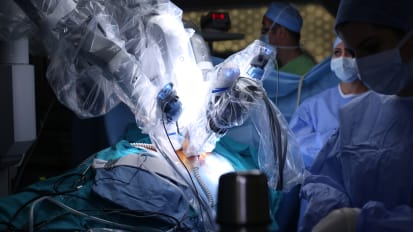 Video
Video
Robotic Surgery Leads to Faster Recovery Time
James Park, MD, explains the benefits of robotic surgery and how minimally invasive procedures allow patients a quicker recovery period.
 Video
Video
Risk-based Breast Cancer Screening
Janie Lee, MD, MSc, identifies subgroups of women who may be at high risk, describes screening in the primary care setting and considers the multi-level support needed for successful implementation.
 Video
Video
Cameron J. Turtle, MD, PhD, covers the background and rationale for CD19 CAR-T cell therapy, clinical responses and approaches to mitigate toxicity.
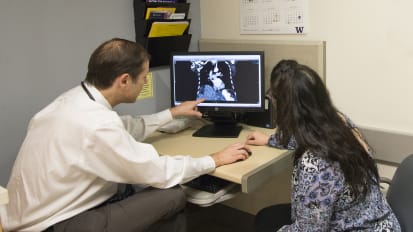 Video
Video
Treatment In The Management Of Diffuse Large B-Cell Lymphoma And Follicular Lymphoma
Ryan Lynch, MD, on diffuse large B-cell lymphoma and follicular lymphoma: integrating components of IPI score with pathology information to create an evidence-based treatment approach and assessing which patients require systemic and/or local therapy.
 Video
Video
Breast Cancer Screening and Benign Breast Disease
Meghan Flanagan, MD, presents on benign breast disease, which is a symptomatic breast condition with physical signs and symptoms that go beyond expected physiologic changes.
 Video
Video
Advances in Lung Cancer Treatment
Keith D. Eaton, MD, PhD reflects on the past 15 years of his career and discusses advancements in lung cancer treatment.
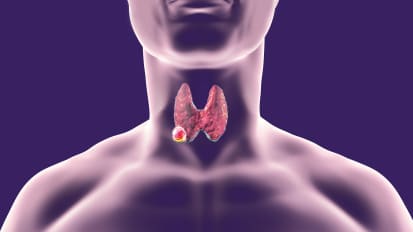 Video
Video
Thyroid Cancer: Incidence, Diagnosis, and Treatment
Nicole Zern, MD discusses papillary thyroid carcinoma.
 Video
Video
Colorectal Cancer: From Polyp to Treatment
Stacey Cohen, MD, gives a presentation on how to understand the standard screening and risk factors for colorectal cancer.
 Video
Video
Management of Non-Muscle Invasive Bladder Cancer
Jonathan Wright, MD, provides an overview of the management of non-muscle invasive bladder cancer
 Video
Video
Integrating Surgery into Multimodal Management of Soft Tissue Sarcoma
Teresa Kim, MD, describes integrating surgery into the multimodal management of soft tissue sarcoma
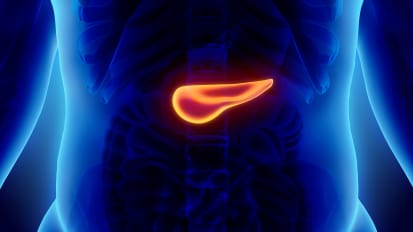 Video
Video
Fighting Pancreatic Cancer: One Family's Journey
It is estimated that 40,560 people will die from Pancreatic Cancer this year. Thanks to the tireless work of UW Medicine’s Dr. Terri Brentnall, that number will not include an extended family she’s been studying over the last 20 years.
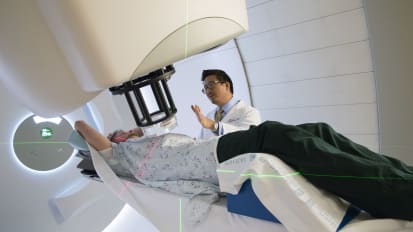 Video
Video
The Role of Proton Beam Radiotherapy in the Management of Solid Tumors
Ramesh Rengan, MD, discusses the strengths and limitations of proton beam radiotherapy.
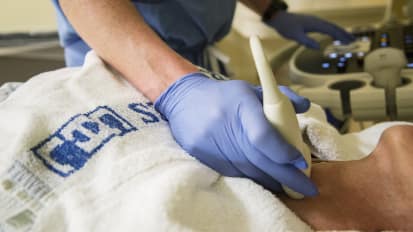 Video
Video
Unraveling the Headlines: The Thyroid Cancer Dilemma
Mara Roth, MD, discusses changes in the approach to treatment and management of thyroid cancer.
 Video
Video
Eric Holland, MD, talks about a combination of mouse brain tumors and human brain tumors.
 Video
Video
Colorectal Carcinoma: Surgical Management of Liver Metastases
Raymond Yeung, MD, gives a lecture on minimally invasive therapies for colorectal carcinoma.
 Video
Video
Prostate Cancer Screening: Is it for Everyone?
Atreya Dash, MD, gives a lecture on the principles and importance of prostate cancer screening.
 Video
Video
Cardio-Oncology: Risks of Cardiovascular Complications in Cancer Survivors
Richard Cheng, MD, gives an overview of the risk of cardiovascular complications in cancer survivors.
 Video
Video
Innovations and Updates in the Surgical Treatment of Colorectal Cancer
Mukta Krane, MD, discusses diagnostic and treatment approaches of colorectal cancer.
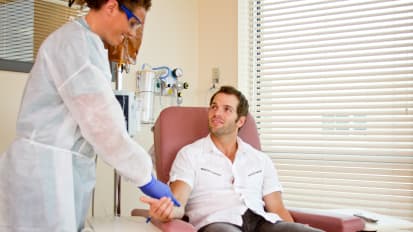 Video
Video
New Discoveries in Prostate Cancer Genetics
Heather Cheng, MD, discusses new discoveries on prostate cancer genetics.
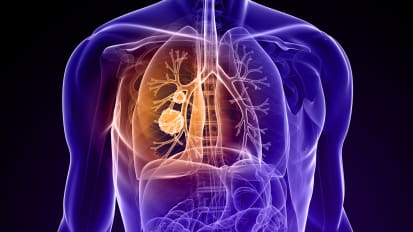 Video
Video
Lung Cancer Screening: The Development of Guidelines and Policy
Douglas Wood, MD, and David Madtes, MD, give a presentation on lung cancer screening and some of the guidelines and development of policy.
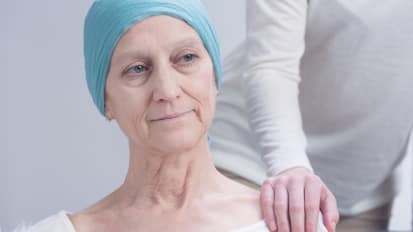 Video
Video
The HPV + Head and Neck Cancer Epidemic: What You Need to Know
Jeffrey Houlton, MD, gives a presentation on HPV and Oropharyngeal cancer.
 Video
Video
The ABCs of Pituitary and Skull Base Tumors
Manuel Ferreira, MD, discusses the most common types of skull based tumors.
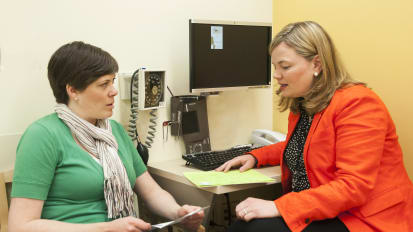 Video
Video
Encountering Ovarian Cancer in the Primary Care Setting
Kathryn Pennington, MD, describes the patterns of care in treating ovarian cancer, while identifying women who are at risk.
Information & Resources
 News
News
New Technique Shows How Individual Cancer Cells React to Drugs
The sci-Plex method profiles gene expression in thousands of individual cells when a sample is perturbed. The technology holds promise for cancer, infection, prenatal medicine and biomedicine research.
 News
News
Men Can Get Breast Cancer, Too
Rachel Yung, MD, a medical oncologist with UW Medicine and the Seattle Cancer Care Alliance, says the treatment for breast cancer is the same for men and women.
 News
News
A drug long used to treat HIV, when paired with chemotherapy and radiotherapy, appears to enhance survival for patients with inoperable non-small cell lung cancer.
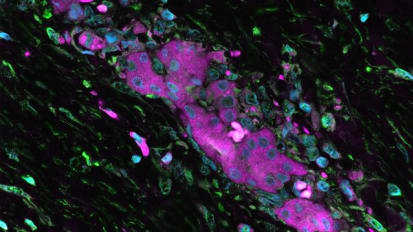 News
News
Treatment Target Pinpointed for Liver Cancer in Young Adults
John D. Scott, MD, focuses on treating young adults with fibrolamellar carcinoma or FLC.
 News
News
Simpler Name for Cancer Genetic Syndrome Could Save Lives
Colin Pritchard, MD, argues that people of all sexes can have risk genes that are often assumed to affect only women. Renaming the syndrome should aid cancer prevention and treatment.
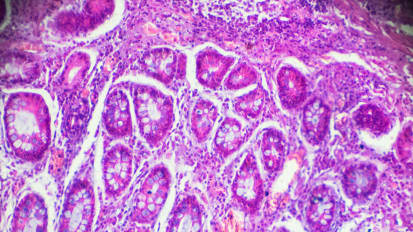 News
News
Brian Shirts, MD, discusses why patients with pathogenic variants in CDH1 should think differently about risk when considering prophylactic gastrectomy.
 News
News
1,000s of Breast Cancer Gene Variants Engineered, Analyzed
A new scientific analysis of nearly 4,000 mutations deliberately engineered into the BRCA1 gene will immediately benefit people undergoing genetic testing for breast or ovarian cancer risk.
 Document
Document
The UW Medicine-Seattle Cancer Care Alliance Liver Tumor Clinic is the largest specialty clinic in the region dedicated to the care of patients with benign or malignant liver tumors.
 News
News
MAGENTA Test Can Screen for Ovarian Cancer
A home genetic testing project offers hope to women who wonder if they may be at risk for ovarian cancer.
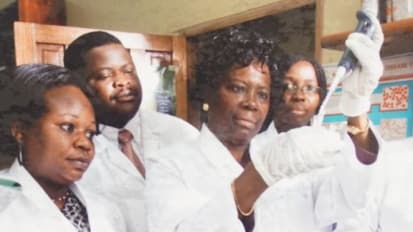 News
News
Gene Testing of Nigerian Women Could Help Prevent Breast Cancer
The first study of its kind applying modern genomics technology to DNA contributed by Sub-Saharan African women has shown they are more likely than women of other ancestries to develop and to die from triple-negative breast cancer. In ...
 News
News
HPV Tests Found Effective in Detecting Cervical Cancer
KING-TV 5 interviews Dr. Rachel Winer, an HPV expert at UW, about new research.
 News
News
New Technique Adheres Cancer-Fighting Agents to Prostate Tumors
Researchers may have finally found a way to destroy only tumor cells but not surrounding healthy cells.
 Document
Document
Skin Cancer Biopsy: Can You Trust the Results?
Study of the variability in melanoma diagnostic findings and the challenges surrounded classifying biopsies.
 Document
Document
The UW Medicine Regional Heart Center Cardio-Oncology Clinic provides care to patients in all stages of cancer treatment who have or are at increased risk for heart disease.
 Document
Document
Neuroscience Pearls: Primary Brain Tumors
Neuroscience Pearls: A publication from the UW Medicine Neurosciences Institute. Here we bring you key points related to Primary Brain Tumors.
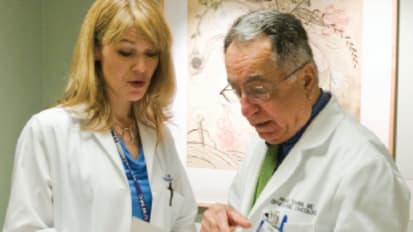 Document
Document
The UW Medicine gynecologic oncology team at University of Washington Medical Center consists of nationally recognized healthcare professionals with extensive clinical knowledge and surgical expertise to prevent and treat cancers.
 Document
Document
Gynecologic Cancer Care: Meet Our Team
UW Medicine gynecologic oncology experts work with patients to prevent and treat complex gynecologic cancers.
Research & Publications